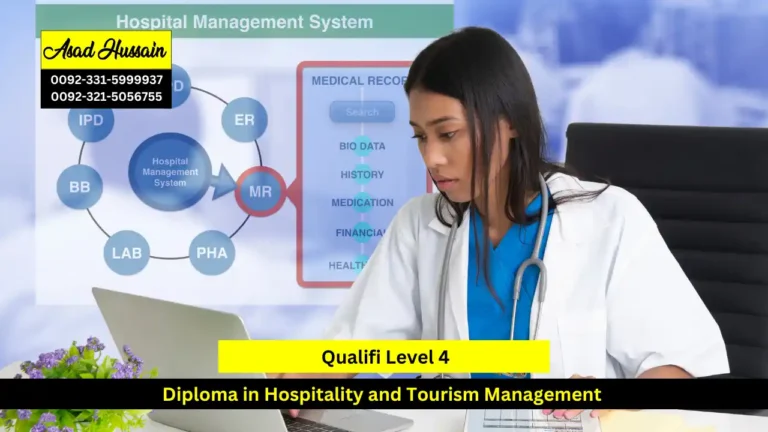The LICQual Level 6 Diploma in Health Economics emerges as a crucial qualification for professionals aiming to understand and influence the economic decisions that shape health outcomes. Health economics plays a vital role in determining how limited healthcare resources are distributed effectively to maximize patient benefit. This comprehensive health economics diploma provides learners with the expertise to evaluate healthcare interventions, optimize resource allocation, and design strategies that enhance the sustainability of health systems worldwide.
LICQual Level 6 Diploma in Health Economics is designed to give students an in-depth understanding of how economic principles apply within healthcare and public health settings. The course explores essential topics such as cost-effectiveness analysis, health technology assessment, cost-benefit evaluation, and policy modeling. Learners gain both theoretical knowledge and practical analytical skills that enable them to interpret and influence policy decisions at local, national, and international levels. As a globally recognized health economics qualification, this diploma equips learners to make evidence-based recommendations that drive efficiency and effectiveness in healthcare delivery.
Throughout the program, participants develop advanced analytical and decision-making skills needed to assess economic outcomes in health-related programs and interventions. You will learn to measure and compare costs, interpret health data, and assess economic impact using techniques such as quality-adjusted life years (QALYs) and incremental cost-effectiveness ratios. These skills are essential for those aspiring to contribute to economic evaluation in healthcare and ensure that financial investments in health produce measurable improvements in population well-being.
This health economics diploma emphasizes practical application. Learners engage in real-world simulations and case studies where they design and evaluate health policies, model economic outcomes, and communicate findings effectively to stakeholders. By combining data analysis with ethical and social considerations, the course prepares graduates to make impactful decisions in healthcare management, insurance, and public policy sectors. The practical orientation of this diploma ensures that learners not only understand health economics concepts but can also apply them in professional contexts to improve system efficiency and patient outcomes.
This course is particularly suited for healthcare professionals, economists, policymakers, and researchers seeking to specialize in health economics. Whether you are aiming for a career in healthcare consultancy, governmental health agencies, or global organizations, the LICQual Level 6 Diploma in Health Economics offers a solid foundation for professional advancement. With its comprehensive content and flexible learning structure, it caters to both early-career professionals and experienced practitioners looking to enhance their analytical and policy formulation capabilities.
To enhance visibility and reach among prospective learners, this course introduction naturally integrates high-CTR keywords such as LICQual Level 6 Diploma in Health Economics, health economics diploma, economic evaluation in healthcare, health policy analysis, cost-effectiveness analysis, and health economics qualification. These strategic keywords are embedded organically to improve search engine optimization while maintaining academic integrity and readability. By emphasizing relevance, skill development, and professional application, this introduction positions the LICQual diploma as a leading choice for anyone seeking to advance their expertise in health economics and policy.
Program Highlights
Mandatory Units
- Principles of Health Economics
- Health Technology Assessment (HTA)
- Costing and Resource Allocation in Healthcare
- Economic Evaluation Methods
- Healthcare Policy and Decision Making
- Data Analysis and Health Outcomes Measurement
The LICQual Level 6 Diploma in Health Economics is an internationally recognized qualification designed for professionals seeking to master the economic principles that drive decision-making in healthcare. In today’s complex healthcare landscape—where resources are limited, and demand for efficient, equitable services continues to rise—understanding health economics has become essential. This diploma equips learners with the analytical, strategic, and policy-oriented skills required to evaluate healthcare systems, design cost-effective interventions, and guide evidence-based resource allocation.
Age Requirements
- Applicants must be at least 18 years old at the time of enrolment.
- Candidates below 18 may be considered in exceptional circumstances with verified parental or guardian consent and proof of academic maturity.
- Applicants should demonstrate readiness for advanced academic engagement and professional-level coursework, reflecting a strong commitment to pursuing expertise in health economics and healthcare policy.
Educational Requirements
- A high school diploma or an equivalent qualification is required for admission into this diploma program.
- While prior studies in economics, public health, healthcare management, or business administration are beneficial, they are not mandatory.
- Learners are encouraged to have a basic understanding of economic principles or healthcare systems to fully engage with course materials and maximize learning outcomes. The program is structured to support both beginners and experienced professionals aiming to advance their careers through an internationally accredited health economics diploma.
Professional Experience
- Although not compulsory, having 1–2 years of professional experience in healthcare administration, economics, or public policy is advantageous.
- Individuals with practical exposure to data analysis, cost-effectiveness assessment, or health policy development will find the program particularly enriching.
- Professionals such as healthcare managers, policy analysts, consultants, and economists can immediately apply the knowledge and skills gained from this LICQual Level 6 Diploma in Health Economics to real-world healthcare challenges, improving system efficiency and patient outcomes.
English Language Proficiency
- Applicants who have previously completed education in English-medium institutions may be exempted from additional English language proficiency testing.
- Strong English reading, writing, and communication skills are essential for comprehending study materials, participating in analytical discussions, and completing written assessments.
- International learners must demonstrate English proficiency through recognized qualifications such as IELTS (minimum overall band score of 5.5) or equivalent. This ensures learners can confidently engage with the academic rigor and global perspective of the health economics qualification.
The LICQual Level 6 Diploma in Health Economics empowers graduates with the confidence and competence to analyze healthcare markets, evaluate economic outcomes, and influence strategic health policies. This qualification offers an exceptional opportunity to develop expertise in economic evaluation in healthcare, cost-effectiveness analysis, and policy decision-making. Graduates will emerge as skilled professionals capable of contributing to sustainable healthcare financing, optimizing resource distribution, and improving overall system performance. This diploma enables learners to become influential leaders in health economics, shaping the future of health policy, management, and economic research across the global healthcare sector.loma empowers individuals to become influential leaders in healthcare marketing, shaping the future of patient-centered communication and organizational success.
The LICQual Level 6 Diploma in Health Economics provides a comprehensive and practical understanding of the economic, analytical, and policy-driven aspects of healthcare systems. This qualification enables learners to evaluate healthcare interventions, optimize resource allocation, and make informed policy decisions that improve health outcomes and ensure financial sustainability. Through in-depth theoretical study and applied learning, learners will gain the knowledge and technical proficiency required to address real-world challenges in health economics and policy formulation.
Principles of Health Economics:
- Learners will be able to explain the fundamental concepts, theories, and models that underpin the field of health economics and their application within healthcare systems.
- They will learn to analyze how economic principles such as scarcity, supply, and demand influence healthcare access and delivery.
- Learners will evaluate the relationship between economic investment and public health outcomes while applying both microeconomic and macroeconomic frameworks to healthcare scenarios.
- By the end of this unit, students will be able to critically assess the impact of economic decisions on healthcare efficiency, quality, and equity.
Health Technology Assessment (HTA):
- Learners will understand the core principles and processes of Health Technology Assessment and how it guides evidence-based healthcare decisions.
- They will develop the ability to evaluate the safety, efficacy, and cost-effectiveness of medical technologies and interventions.
- Learners will learn to conduct systematic reviews and analyze data to support HTA reports that inform policy and reimbursement decisions.
- They will also assess ethical, social, and economic implications associated with introducing new healthcare technologies across diverse health systems.
Costing and Resource Allocation in Healthcare:
- Upon completing this unit, learners will be able to explain various costing methods used in healthcare, including activity-based costing and cost-center allocation models.
- They will assess how financial planning and budgeting influence the efficiency and sustainability of healthcare organizations. Learners will design resource allocation models that promote fairness, transparency, and optimal service delivery.
- They will also evaluate the impact of economic and policy decisions on patient care outcomes and organizational performance, ensuring that limited healthcare resources are used effectively and equitably.
Economic Evaluation Methods:
- Learners will be able to differentiate between cost-effectiveness, cost-utility, and cost-benefit analyses in healthcare decision-making.
- They will gain the ability to perform incremental cost-effectiveness ratio (ICER) calculations and apply modeling techniques such as decision trees and Markov models to predict health outcomes.Learners will develop skills to critically appraise published economic evaluations and interpret findings for policy and management purposes.
- By mastering these methods, learners will contribute to evidence-based economic evaluation and support data-driven healthcare investments.
Healthcare Policy and Decision Making:
- Learners will understand how economic analysis informs healthcare policy and strategic decision-making. They will learn to evaluate various policy instruments—such as regulation, taxation, and subsidies—and their effects on healthcare markets.
- Learners will apply economic reasoning to formulate policy proposals that enhance healthcare access, affordability, and quality.
- They will also assess the influence of global health organizations and economic frameworks on national health systems, strengthening their capacity to contribute to effective health governance.
Data Analysis and Health Outcomes Measurement:
- Learners will be able to apply statistical and econometric tools to analyze healthcare data and measure performance indicators.
- They will gain proficiency in evaluating health outcomes using metrics such as Quality-Adjusted Life Years (QALYs) and Disability-Adjusted Life Years (DALYs). Learners will develop the ability to interpret and visualize data for effective decision-making and reporting.
- They will also use analytical methods to assess the cost-effectiveness of interventions and derive insights that can guide healthcare improvements and policy development.
The LICQual Level 6 Diploma in Health Economics empowers learners to integrate economic theory with real-world healthcare practice. Graduates will emerge as competent professionals capable of conducting economic evaluations, designing health policies, and analyzing healthcare data to improve system performance. This diploma provides the essential skills to influence evidence-based decisions, promote sustainability, and lead advancements in global healthcare economics.
The LICQual Level 6 Diploma in Health Economics is an internationally recognized qualification designed for professionals who aspire to influence healthcare policy, management, and decision-making through sound economic principles. As global healthcare systems face increasing challenges related to cost control, resource allocation, and sustainability, this program equips learners with the advanced analytical, strategic, and evaluative skills needed to optimize healthcare outcomes and efficiency.
Healthcare Economists and Policy Analysts
• Professionals currently working or aspiring to work in healthcare economics, policy analysis, or healthcare consultancy.
• Individuals seeking to evaluate healthcare systems, interventions, and reforms using cost-effectiveness and resource optimization models.
• Analysts aiming to strengthen their ability to assess health outcomes, interpret economic data, and influence decision-making in healthcare organizations.
• Learners focused on applying economic evaluation methods to improve healthcare service delivery and policy efficiency.
• Professionals committed to shaping data-informed, equitable, and sustainable health policies through applied economic analysis.
Healthcare Managers and Administrators
• Managers, executives, and administrators in hospitals, clinics, or public health organizations seeking to enhance their understanding of healthcare finance and resource management.
• Professionals aiming to apply economic reasoning to strategic healthcare planning, budgeting, and system performance improvement.
• Administrators dedicated to implementing cost-effective management practices while maintaining quality and patient safety standards.
• Individuals seeking to bridge the gap between economics and management to achieve operational excellence and value-based healthcare.
• Leaders striving to strengthen institutional decision-making through economic analysis and evidence-based planning.
Public Health Professionals and Researchers
• Public health experts and researchers seeking to integrate economic evaluation into program design, policy development, and health interventions.
• Individuals interested in conducting cost-utility, cost-benefit, and cost-effectiveness analyses for healthcare programs and public health initiatives.
• Professionals analyzing healthcare data to improve population health outcomes and optimize public spending.
• Researchers aiming to evaluate the economic impact of diseases, treatments, and preventive strategies within different population groups.
• Learners committed to advancing global health equity through the application of health economics research and methodologies.
Healthcare Consultants and Advisors
• Consultants advising government bodies, NGOs, or healthcare organizations on financial management, policy development, and healthcare system efficiency.
• Professionals supporting strategic healthcare investments through data-driven analysis and economic forecasting.
• Advisors evaluating the financial sustainability of healthcare programs and technological innovations.
• Individuals designing health financing models and providing policy recommendations to improve access, affordability, and quality.
• Experts dedicated to ensuring that healthcare spending leads to measurable improvements in patient outcomes and system effectiveness.
Academics and Educational Leaders in Health Economics
• Educators, trainers, and academic professionals specializing in healthcare economics, policy, or management studies.
• Individuals seeking to expand their teaching and research expertise in health economics and applied policy analysis.
• Scholars aiming to produce impactful research that supports evidence-based reforms and global health system sustainability.
• Academic professionals mentoring the next generation of health economists, researchers, and policy strategists.
• Educators committed to advancing knowledge, innovation, and ethical standards within the field of health economics.
Career-Focused Learners and Future Health Economists
• Individuals aspiring to establish or advance careers in healthcare economics, health policy, or global health management.
• Learners preparing for senior roles in ministries of health, research institutions, pharmaceutical companies, or international health organizations.
• Professionals seeking a competitive advantage through the acquisition of analytical and decision-making skills in economic evaluation.
• Career-oriented individuals motivated to lead initiatives that enhance healthcare value, efficiency, and equity.
• Learners aiming to become influential professionals capable of addressing complex healthcare challenges through economic insight and policy innovation.
The LICQual Level 6 Diploma in Health Economics is ideal for individuals committed to strengthening healthcare systems through evidence-based economic analysis and strategic policy development. Graduates will possess the expertise to conduct economic evaluations, manage healthcare resources efficiently, and influence national and global health policies. This qualification opens pathways to roles in health economics consultancy, public policy, academic research, and healthcare management — empowering professionals to make a lasting impact on the effectiveness, sustainability, and fairness of healthcare delivery worldwide.







